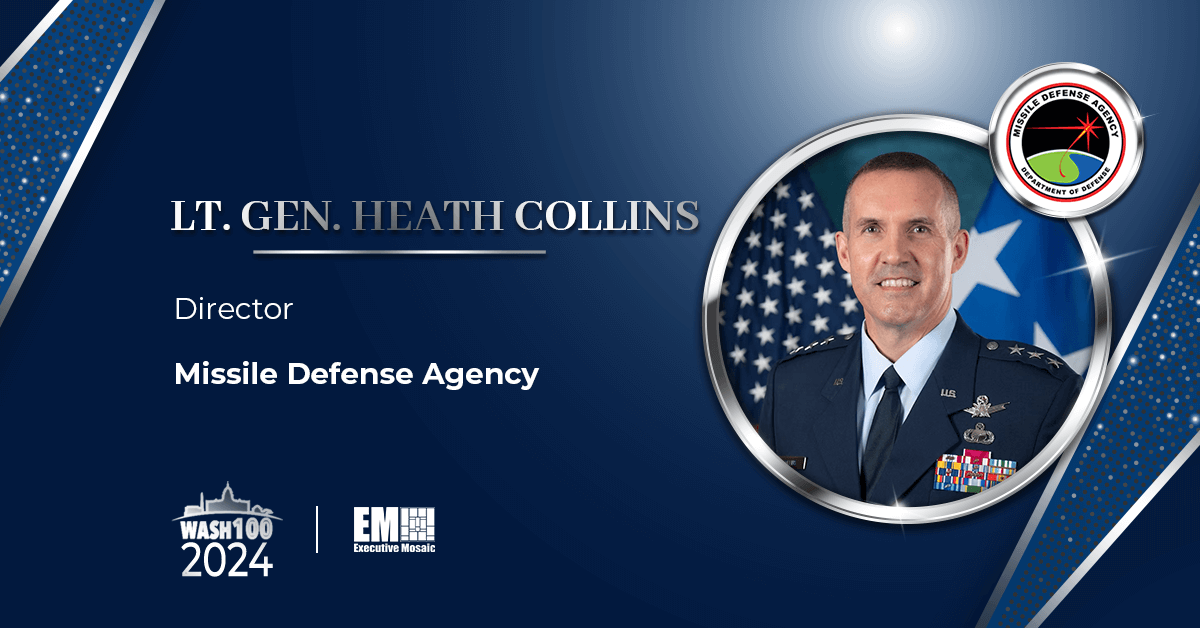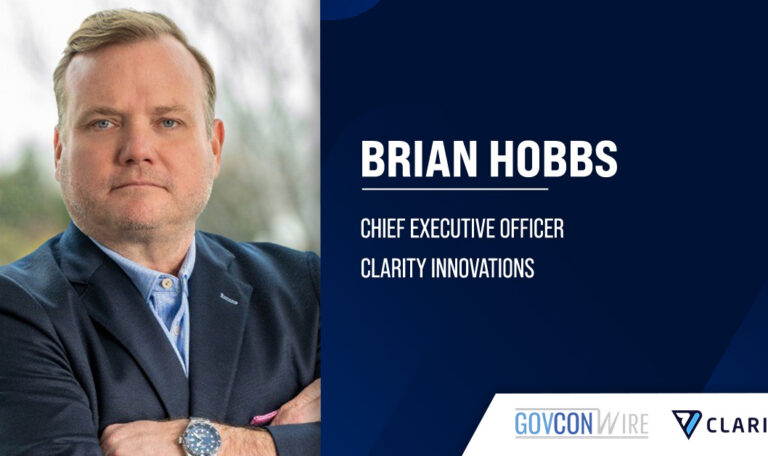Executive Mosaic is proud to announce the selection of Lt. Gen. Heath Collins for the 2024 class of Wash100 Award winners. The Wash100 recognition is conferred annually to the 100 most influential and impactful leaders within the government contracting space.
Vote for Lt. Gen. Heath Collins as one of your favorite GovCon industry leaders for 2024! The Popular Vote Competition of the Wash100 Award runs through April 30, 2024.
This year marks the first win for Collins, who is being honored for the work that he has done and continues to deliver to help improve the capabilities of the U.S. to defend the homeland, troops and allies from missile threats. Collins’ Wash100 win is made more timely by his confirmation in December to serve as the new director of the Missile Defense Agency.
MDA Director Lt. Gen Heath Collins will speak at the Potomac Officers Club’s 2024 Space Summit. Set to take place on March 5, the event will feature experts, government leaders and industry executives, who will discuss the most urgent issues relating to the space domain. Register now to attend this important event!
Jim Garrettson, CEO of Executive Mosaic, said of Collins, “In today’s tense global environment, missile defense has never been more urgent or important. As the newest director of the Missile Defense Agency, Lt. Gen. Collins is tasked with the monumental responsibility of developing and sustaining the Missile Defense System to protect and defend our nation, our armed forces and our allies from growing threats.”
The founder of the Wash100 Award added, “His boundary-pushing vision for the future of MDA has landed him on our 2024 Wash100 list for the first time ever, and we look forward to his continued impacts at the agency’s helm.”
Collins formally assumed the role of MDA director at a change-of-responsibility ceremony in January, the U.S. Army website reports. During the ceremony, Under Secretary of Defense for Research and Engineering Heidi Shyu, a fellow Wash100 awardee, underscored the need for missile defense amid the proliferation of missile threats that has resulted in a “more unstable and dangerous” world. In light of this, Shyu described the newly-appointed MDA head as “absolutely the right leader at the right time.”
For his part, Collins acknowledged the increased threats of missiles around the globe but said, “I’m not worried,” and expressed confidence in the ability of the MDA to address emerging challenges.
“So let’s go fast, let’s think big and let’s get after it. Our nation is counting on us,” Collins added.
Prior to becoming MDA director, Collins held the position of program executive for ground-based weapon systems at the agency. In this capacity, according to a Defense News report, his responsibilities included overseeing the Ground-based Midcourse Defense system, a capability designed to launch interceptors against intercontinental ballistic missiles that North Korea or Iran might fire against the U.S.
The GMD is set to be replaced by the Next-Generation Interceptor. That newly-launched program was also overseen by Collins as program executive; and he may see it through to its completion by 2028 as agency director.
Before joining the MDA, Collins was part of the U.S. Air Force, most recently serving as program executive officer for weapons. In this capacity, his responsibilities included overseeing the development of hypersonic weapons like the AGM-183A Air-launched Rapid Response Weapon and the the Hypersonic Attack Cruise Missile.
Regarding the latter, Collins oversaw the program’s systems requirements phase before moving on to the MDA. As for the former, a failed test in March 2023 seemed to suggest that the program might be put on hold. However, according to an article on Aviation Week, a newly-released report by the Department of Defense’s Director, Operational Test & Evaluation reveals that ARRW had had more successful tests than previously divulged, indicating the possibility that the program may continue in the future.
Now, roughly two months into his new job, Collins already has a pair of important missile defense capability development milestones under his belt.
At the start of February, the MDA, in partnership with the U.S. Navy, conducted a pair of tests dubbed Flight Test Other-23 to evaluate the ability of the Aegis weapon system to defeat a medium-range ballistic missile target. During the first phase of the test, the Aegis system was able to track and discriminate the target amid a complex target scene. The second phase saw the firing of a Standard Missile – 3 Block IIA weapon to eliminate the target.
The test took place off the coast of Hawaii and saw the participation of a pair of Navy guided missile destroyers. Collins described the activity as “a key milestone in giving our Aegis Ballistic Missile Defense ships increased sensing and tracking tools to combat threat proliferation.”
More recently, the MDA and the Space Development Agency launched six satellites into orbit: two MDA Hypersonic and Ballistic Tracking Space Sensor satellites and four Proliferated Warfighter Space Architecture Tranche 0 Tracking Layer satellites. Over the next two years, the spacecraft will undergo on-orbit testing.
HBTSS and the PWSA Tracking Layer provide the U.S. with the ability to detect and track missile threats — including hypersonic weapons — at all phases of flight.
On LinkedIn, Collins said he was proud of the team that made the launch possible and touted HBTSS as “the key to the future of hypersonic and ballistic missile defense.”
Collins has only begun his term as head of the MDA but his background and accomplishments indicate that he will not only be a successful leader of the agency but also embody the qualities that the Wash100 award celebrates.
Executive Mosaic congratulates the new MDA director and his team for the win.
Cast a vote now to select Lt. Gen. Heath Collins as one of your favorite GovCon industry leaders for 2024!















